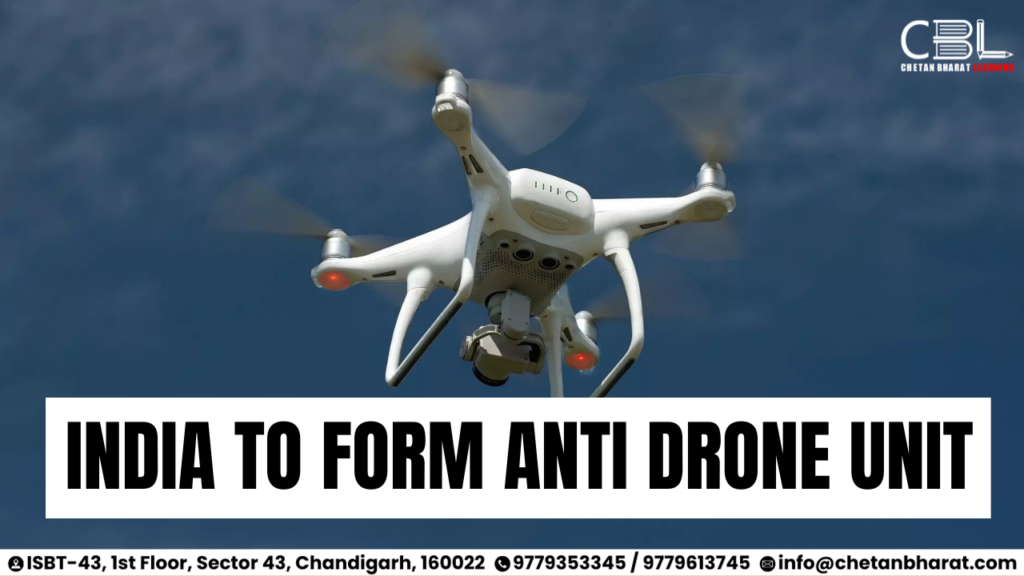
Important for UPSC, State PCS
Prelims: Technology . Anti Drone Unit .
Mains: General Studies Paper 3 – Defence technology , Internal Security .
Context-
- A comprehensive anti-drone unit to be established, involving Defence Ministry, MHA, DRDO, and other agencies.
- Deployment of laser-equipped anti-drone systems increased interception success from 3% to 55% in Punjab.
Rising Drone Threat
- Significant increase in drone interceptions in 2024 (260+ incidents) compared to 110 in 2023.
- Drones mainly used for smuggling arms and drugs, with hotspots in Punjab, and fewer incidents in Rajasthan and Jammu.
Why are Drones a Growing Menace?
- Accessibility and Affordability: Drones are becoming increasingly accessible and affordable, making them attractive tools for non-state actors and criminal elements.
- Versatility: Their versatility allows for diverse malicious uses, from smuggling contraband and weapons to conducting surveillance and even carrying out attacks.
- Difficult to Detect and Intercept: Small drones are difficult to detect and intercept with traditional radar systems, posing a challenge for security agencies.
India’s “Whole of Government” Approach
- Collaboration is Key: Tackling the drone threat requires a multi-agency approach, involving defense organizations, research institutions, and various security forces. This ensures a coordinated and comprehensive response.
- Technology and Indigenous Development: India is focusing on developing indigenous anti-drone technology, reducing reliance on foreign systems and strengthening self-reliance in defense.
Examples of Anti-Drone Systems
- DRDO’s Soft Kill and Hard Kill Systems: These represent a two-pronged approach, with soft kill jamming drone communication links and hard kill using lasers to destroy them.
- Laser-equipped anti-drone gun-mounted mechanism: Deployment along the India-Pakistan border has shown promising results in neutralizing drone threats.
- Counter Drone System (D4 System): This system provides real-time detection, tracking, and neutralization capabilities, crucial for protecting critical infrastructure and public events.
Way a head –
Here’s the information about India forming an anti-drone unit in a point-wise format:
- Formation of Anti-Drone Unit: India is set to form a dedicated anti-drone unit to counter the growing threat of drones.
- Purpose: The unit will focus on detecting, intercepting, and neutralizing hostile drones used for various purposes, including surveillance, smuggling, and attacks.
- Security Focus: The unit’s primary aim is to protect critical infrastructure, military bases, and border areas from drone incursions.
- Rising Threat: The move comes in response to the increasing use of drones in conflict zones and their potential misuse in security threats, including across India’s borders.
- Advanced Technology: The anti-drone unit will be equipped with cutting-edge technologies specifically designed to detect and neutralize drones.
- Collaboration: The unit is expected to work in coordination with other security agencies, including armed forces, to ensure national security.
- Part of Defense Modernization: This initiative is part of India’s broader defense modernization plan to counter emerging threats and enhance national defense preparedness.
- Counter-Drone Technologies: The formation of the unit will support the development and deployment of counter-drone technologies at a national level.
- Global Security Context: The move reflects India’s proactive approach to tackling evolving security challenges, especially the use of drones by non-state actors and adversarial forces.
- Commitment to National Security: The anti-drone unit underlines India’s commitment to staying ahead of security threats and maintaining a strong defense infrastructure.
CBL Practice Questions for Prelims –
Which of the following will the Anti-Drone Unit primarily protect in India?
a) Urban areas and commercial buildings
b) Critical infrastructure, military bases, and border areas
c) Airports and rail stations
d) Educational institutions
Answer: b) Critical infrastructure, military bases, and border areas
CBL Mains Practice Question
“As drones become more prevalent, there is a need for India to adopt comprehensive counter-drone strategies.”




Leave a Reply
You must be logged in to post a comment.